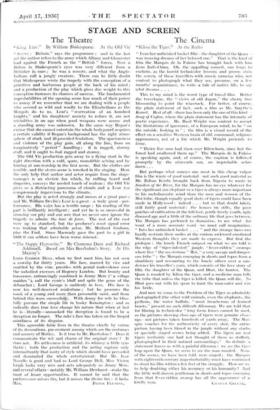The Cinema
" Ix:ro her unfinished basket Dhi—the daughter of the Quan -- was weaving dreams of her beloved one." That is the kind of •
aunt the Marquis de-la Falaise has brought back with him from Indo-China. Oh, the appalling conceit, one longs to
exclaim, as the, horrid technicolor browns and greens stain the screen, of these travellers with movie cameras who, not. content to photograph what they see, presume, on a few months' acquaintance, to write a talc of native life, to say what dreams . . .
This to my mind is the worst type of travel film. Better the travelogue, the " views of old Japan," the cherry tree blossoming to point the wisecrack. Far better, of course, the plain statement of fact, such a film as Mr. Smythe's Kamef. Best of all—there has been only the one of this kind-- Song of Ceylon, where the plain statement has the intensity of .poetic experience. Mr. Basil Wright was content to accept the_ limitations of ignorance, of a European mind, to be " on the outside, looking in " ; the film is a visual record of the effect on a sensitive Western brain of old, communal, religioug appearances, not of a life which Mr. NVright pretends to know.
" Thrice five suns had risen over Klien-Mara, since last the 'forest had swallowed them up." The Marquis de In Falaise is speaking again, and, of course, the caption is followed promptly by the sixteenth sun, an improbable ochre dawn ...
But perhaps what annoys one most in this cheap vulgar .film is the waste of good material--not such good material as Mr. Zoltan Korda brought back from Nigeria to waste in Sanders of the River, for the Marquis has no eye whatever for the significant (an elephant or a tiger is always more important to his melodramatic mind than the men and women of the Moi tribe, though equally good shots of tigers could have been made in Hollywood ; indeed . . . but to that doubt later), still fairly good material : the houses bn stilts, the Prior patches of cultivation at the hill foot, gentle lovely youth, 'ugly diseased age and a little of the ordinary life that goes between. The Marquis has •preferred to dramatise, to use what—for want of a more accurate word—we must call imagination. " Into her unfinished basket . . . " and the strange faces can hardly restrain their smiles at the curious awkward emotional Western thoughts they are made to express. But first the prologue : the lonely Preach outpost on what we arc told is the edge of "tiger-infested" jungle, "fever-ridden" swamps where live " the iliy'.terious " Moi, " a very savage and danger- ous tribe " : the Marquis emerging in shorts and topee from a shrubbery and recounting to the lonely officer over u sun- downer his traveller's yarn, which consists of the love story of Dhi, the daughter of the Quan, and Bhat, the hunter. The Quan is mauled by Kliou the tiger, and a medicine man tells the tribe that unless the tiger is killed, the Quan will die. So Bhat goes out with his spear to hunt the man-cater and win his bride.
And now we come to the Problem of the Tiger so admirably photographed (the other wild animals, even the elephants, the pythons, the water buffalo, " most treacherous of horned beasts," present no such difficult dilemma). We arc told that for filming in technicolor " long focus lenses cannot be used, so the pictures showing close-ups of tigers were genuine close- ups—not pictures taken hundreds of yards away. The Mar- quis vouches for the authenticity of every shot, the entire picture having been filmed in the jungle without any studio or specially staged scenes being added. The tigers are real tigers (certainly one had not thought of them as stuffed), photographed in their natural surroundings." So definite statement leaves us with a painful dilemma : we see the tiger leap upon the Quan, we seem to see the man mauled. NOWc of the scenes, we have been told, were staged ; the Marquis with eighteenth-century imperturbability must have continued to shoot his film within a few feet of the struggle. I low are we to help doubting either his accuracy or his humanity? And the little well-shaven gentleman in shorts and topee emerging from that fever-ridden swamp has all the appearance of a












































 Previous page
Previous page